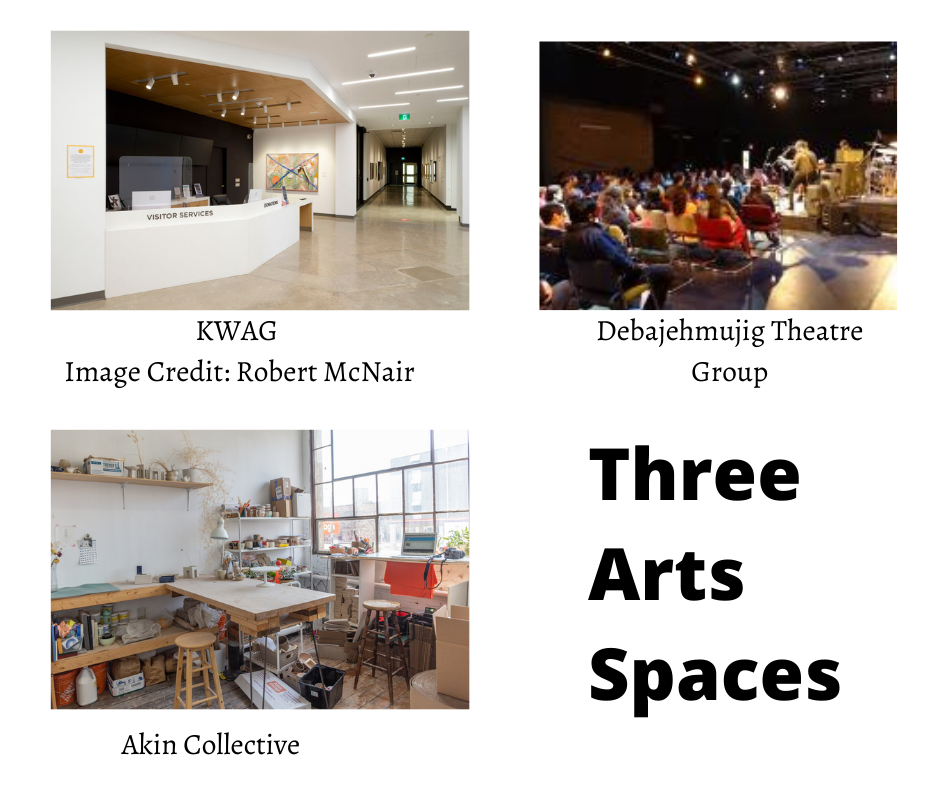There is no doubt that the COVID 19 has hit the arts and creative businesses hard. The pandemic brought hardship and loss not only in business and revenue, but also in creative production and presentation. As Ontario is in the midst of Step 3 on the Roadmap to Reopening, we decided to catch up with Debajehmujig Theatre, the Kitchener-Waterloo Art Gallery (KWAG), Akin Collective to reflect on the past year and see what reopening looks like for them. How has your organization evolved with COVID?
How has your organization evolved with COVID?
Debajehmujig Theatre: “COVID came at a time when we were developing a digital adaptation strategy. As things began to evolve, our operations utilized the hybrid model where we had some in person audience members, and some online. Through the year we had several events. At Easter, there were two festivals over the weekend, at halloween there was a Horror storytelling, and in winter, an online winter cabaret was developed. The team is innovative so we created ways to ensure we remained active, relevant, and responsive to the communities we serve. It was important to us to maintain our core concept of sharing and educating on Indigenous culture. Furthermore, being provocative and courageous in that work.”
KWAG: “KWAG transitioned to the work-from-home model while delivering activity online. That included developing a new digital tool on our website to host exhibitions, like our annual student exhibition. We also changed the way we used our blog and e-newsletter to provide more story-driven content. We developed more virtual programs for kids and families, developed a Summer Art Camp program based on take-home art kits, created downloadable lesson plans for teachers and schools to replace our in-school programs, and hosted Artist Talks on Zoom. We have been combining on-site exhibitions (even small-group tours) and outdoor programs with virtual offerings ever since.
Akin: “As an organization offering in-person arts programming, and providing workspace to artists in open-concept shared working environments, we had to adapt our services quickly. We launched our Studio Rent Relief Fund at the very beginning of COVID-19 to support artists facing financial hardships with covering their studio rent. Our staff was able to work from home quite readily. We did have to adapt our intake process for new members as we stopped doing on-site in-person tours. We switched to virtual meetings only, increased the frequency of mental-health check-ins and generally practiced more patience and care with each other. We lost many of our studio members during COVID-19, who chose to work from home exclusively rather than keep a rental studio. While this was the best and safest option for many, we have had to close 5 of our studio locations since early 2020: Akin Lansdowne, Akin X Collision Gallery, Akin River, Akin Sunrise and Akin Lakeshore. Because of our membership loss and studio closures our organization has taken a huge financial hit as a result of COVID-19 and we are grateful to have been able to continue operating despite that.”
How are operations changing with COVID restrictions beginning to loosen up?
Debajehmujig Theatre: “What works for Debajehmujig is the focus on our strategic and operational plans, assessments post event, and building upon consumer confidence and trust being a priority. The creation process will continue to evolve and productions will adapt to the changing times. However the roots will remain the same.”
KWAG: “We are allowed to operate Summer Art Camps during this time, but are maintaining the hybrid model we developed over the last year so we have both virtual camps and outdoor-focused camps on-site with a much smaller group of campers. We’ve installed our new summer exhibition, a wave in other words, with a very minimal crew of exclusively KWAG staff.
Akin: “Although the virtual programming did the trick, the in-person element is missing from our community. Upcoming events include a live Art In The Park session, an outdoor Show & Tell (for members to show new work in a peer-supported environment), and if all goes well a group exhibition opportunity.”
What changes are here to stay?
Debajehmujig Theatre: “We made adaptations for hybrid events, contactless payments and bookings, as we developed our production. We will have to adapt for custom sets, which include maintaining and building consumer and operational confidence. Other holistic practices such as wellness check-ins will likely stay, adaptation to work from home at times if required.
KWAG: “We’re committed to maintaining a hybrid model of on-site and online programs for the long term, now that we’ve seen the benefits of improved reach and accessibility with our virtual programs. While KWAG is always going to push for in-person engagement, we see great potential in retaining our online audience, especially for folks who tune in for Artist Talks, to create engagement across the country and from the comfort of one’s own home.”
Akin: “Virtual meetings and an adapted intake process for new members like sharing studio visuals virtually before scheduling in-person tours will definitely stay. We will also keep offering the Studio Rent Relief Fund to our members indefinitely as long as our continual fundraising efforts for the fund are successful. We also plan to keep some aspects of our virtual programming to help audience reach”
As we continue to recover from COVID-19, ArtsBuild Ontario has resources, such as upcoming COVID relief funding opportunities, that might be useful for you and your creative space! Check out our website for more information on learning, building, and managing your creative space!
The quotes in this article have been edited for length. We would like to thank Stephanie Vegh from Kitchener Waterloo Art Gallery, Lynda Trudeau from Debajehmujig Theatre and Jen Pilles from Akin Collective for their response and contributions to this blog.


